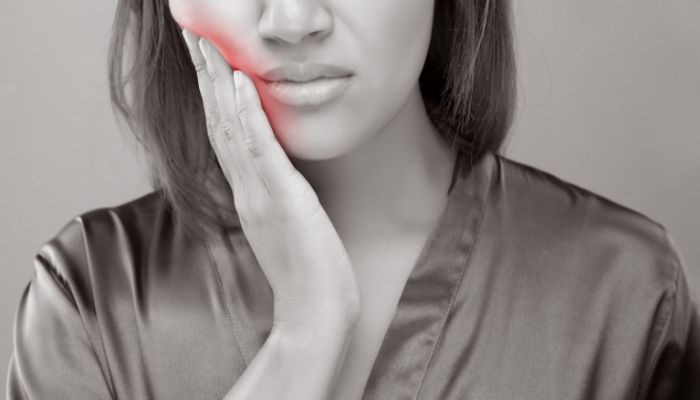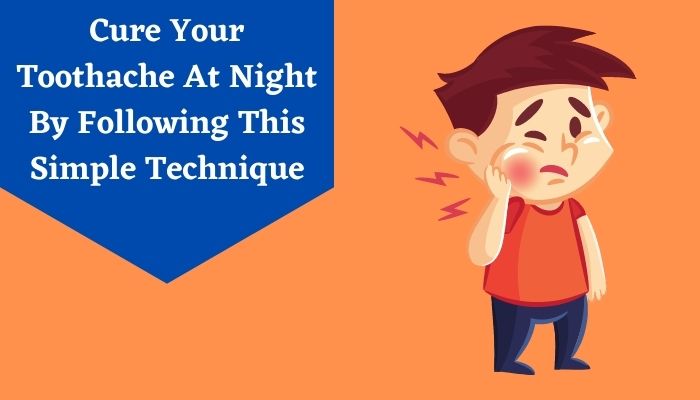Toothache can cause intense pain and discomfort, making it hard to concentrate on any other task. Sadly, tooth pain often becomes worse during the night, leading to restless sleep and unpleasant mornings. Fortunately, there are a few easy home remedies for toothache at night that you can try to help alleviate tooth pain, enabling you to finally get the peaceful rest you deserve.
Toothache occurs when there is damage to the gums or teeth, which can be caused by various factors such as infections, cavities, or irritation to the nerves inside the teeth. This can also involve damage caused to the protective layer of your teeth called enamel.
In some cases, tooth pain may be associated with other conditions like sinus infections or ear infections. These factors can contribute to the discomfort and pain experienced during a toothache.
You can now cure toothache at night with the help of some really simple and easy-to-implement techniques. From teeth pain tablets and other teeth pain medicine names to home remedies, find out everything you need to know for fixing the situation.
Condition: Severe Toothache at Night
Remedies for Toothache:
- Medication or Tablets
- Ointments
- Cold Compress
- Herbal Remedies
- Salt Water Rinsing
Toothache At Night
Nothing could be more painful and annoying than a severe toothache at night. It makes falling asleep almost impossible while keeping you on the edge of your toes all night long! The intensity of toothaches only seems to increase at night, which is another dampener. However, there are several solutions for getting toothache pain relief that you will find here.Curing Toothache at Night
Here are some of the steps you should follow for relieving toothache at night: Medication You can consult your doctor for getting the right teeth pain medicine names and also other teeth pain tablets alongside. You can opt for OTC (over-the-counter) medications for relieving pain including Tylenol or acetaminophen and even ibuprofen with the advice of your doctor. Make sure that you are following the dosage instructions strictly.
Medication You can consult your doctor for getting the right teeth pain medicine names and also other teeth pain tablets alongside. You can opt for OTC (over-the-counter) medications for relieving pain including Tylenol or acetaminophen and even ibuprofen with the advice of your doctor. Make sure that you are following the dosage instructions strictly.
1. Cold Compress Method
You can relieve your pain with a cold compress at times. Fill up a bag with ice and wrap it in a towel. Put it on the affected zone of the face. This will help in numbing the pain temporarily. You may also apply a cold compress for roughly 10-20 minutes every evening in order to prevent the pain from recurring when you’re about to doze off2. Elevate Your Head
You may try putting another pillow or even two under your head for elevating it suitably. This may work temporarily in giving you some pain relief, helping you sleep the night away at least.3. Medicinal Ointments
There are many options available for medicinal ointments that you can talk to your doctor about. Ask about numbing or pain-relieving gels which have specific ingredients.Oral anaesthetics can provide temporary relief from dental pain when applied to the specific area that is causing discomfort. These numbing agents work by temporarily blocking the sensations of pain in the affected region. Although their effects may only last for a few minutes, those few minutes of relief can be valuable in helping you get some rest. It's important to note that these medicinal ointments should be used under the supervision of a dentist to ensure proper application and dosage. Consulting a dentist will ensure the appropriate use of oral anaesthetics for effective and safe pain relief.
4. Rinsing with Salt Water
A home remedy worth following is rinsing with salt water. You can simply follow this technique for keeping the pain at bay and also removing debris or food particles that are stuck in the gums or teeth.Saltwater rinse can be an effective way to combat bacteria in the mouth that could be responsible for gum and tooth infections or irritation. By using lukewarm water to create the rinse and gently gargling for approximately 30 seconds, you can help reduce the presence of harmful bacteria. It's important to spit out the rinse after gargling. This simple and accessible method can contribute to maintaining oral health and providing relief from discomfort caused by oral infections.
5. Using Hydrogen Peroxide
Hydrogen peroxide may also help in relieving pain while combating periodontitis. However, it should be diluted with an equal serving of water. Do not swallow this solution but only move it around in your mouth. It is a commonly used antiseptic with properties that can be beneficial for oral health. It is used for several years to address dental problems like cavities and gum disease.When used as a mouth rinse, it can help eliminate infection-causing plaque and bacteria, thereby reducing swelling and discomfort. To use hydrogen peroxide safely, it is important to make a dilution with an equal amount of water. Swish the diluted solution inside your mouth for about 60 seconds before spitting. This can provide relief and promote oral hygiene.
6. Drinking Peppermint Tea
You can use peppermint tea for temporary relief from a toothache. Studies have noted how peppermint comes with notable anti-bacterial and antioxidant attributes. Menthol may also help in numbing particularly sensitive zones.7. Clove Also Works Wonders
Cloves contain Eugenol that may help with tooth pain relief. Studies have shown how Eugenol helps in lowering inflammation and overall pain levels considerably. It functions in the manner of what we know as an analgesic, helping numb the affected area seamlessly. You can also gently chew or suck on a clove and keep it lodged against the tooth which is giving you constant pain.8. Garlic May Also Help
Garlic is a common and readily available item that may help in combating toothache. It contains allicin as its core compound that has antibacterial properties. Chew softly on garlic or let it rest against the painful tooth and you will see the results.What Leads to Toothaches in Most Cases?
There are many reasons behind painful toothaches. Decaying teeth are the commonest reason behind painful toothaches and this may also lead to cavities if left untreated. Cavities take place when the enamel layer is broken by the bacteria and acids and they chip away at the sensitive and delicate tissues within teeth. This may expose the nerves, leading to severe discomfort and pain. Many people also suffer from toothaches as a result of sinus-related infections.Some other potent causes include any abscesses in the mouth, pain, and trauma of the jaw, grinding teeth, gum or jaw disease, food that is still stuck in the gums or teeth, wisdom teeth, or other teeth that are growing suddenly, and the loss of a filling.
Why does a Person Suffer From Unbearable Toothache at Night?
Toothaches hurt more at night, especially when you're trying to sleep. It seems like toothaches tend to get worse at night as the pain becomes more noticeable without the distractions of the day. There could be a few reasons why you're experiencing dental pain during the night. One possibility is teeth grinding, which can put pressure on your teeth and cause discomfort. Another reason could be plaque build-up, which can lead to tooth decay and sensitivity. It's important to address these issues to alleviate the unbearable toothache at night and ensure a more restful sleep.Eating late-night meals: If you enjoy indulging in sugary treats, it's important to be aware of the impact they can have on the teeth, especially during late-night snacking. Plaque, a thin layer of bacteria that coats your gums and teeth, loves sugar just as much as you do.
When you consume sugary foods, the bacteria in plaque feed on the sugar and produce acids that can harm your teeth, leading to cavities. To prevent this, it's crucial brushing your teeth after indulging in late-night snacks. Neglecting oral hygiene steps, such as not brushing before bed, increases the risk of gum disease and tooth decay. By taking proper care of your teeth, you can minimise the chances of experiencing toothaches at night.
Reduced distractions: Toothaches hurt more at night because at night, fewer things are happening around you to divert your attention from a toothache, which can make you feel that the pain is more intense. When you're trying to fall asleep, your brain can only concentrate on a limited number of things at once. With fewer distractions, it's harder to ignore the discomfort caused by a toothache, making it more noticeable and bothersome. So, when you're lying in bed, the absence of other activities can amplify your toothache and make it feel prominent.
Increased blood circulation: When you sleep, the blood flow to the brain increases. This increased blood circulation can have an impact on your tooth pain. When there is more blood flowing to your head, it can put additional pressure on the painful tooth, leading to an increase in toothache sensation. This is why you may experience more discomfort in your tooth when lying down than when you are standing or sitting upright. The elevated blood flow and pressure exerted on the affected tooth can intensify the pain and make it more noticeable.
Teeth grinding: It's possible that you unknowingly grind your teeth when you sleep. Teeth grinding (bruxism), is a common habit that many people are unaware of. They get up in the morning and experience dental pain and discomfort. Grinding your teeth can lead to various symptoms, such as tooth pain and worn tooth enamel when you wake up. Sometimes, the pain can even spread from the teeth to the jaw and cause headaches. Feeling excessively sleepy in the day is also a common complaint among teeth grinders. If you experience any of these symptoms, it would be beneficial to discuss them with your dentist.
When You Should Visit a Dentist?
If you experience toothache at night, it is important to schedule an appointment with a dentist as soon as possible. While there are temporary home remedies that can provide relief, it is essential to address the underlying cause of the toothache. If the toothache is accompanied by signs of infection, such as swelling or pus, antibiotics may be necessary to eliminate the infection. When a tooth is cracked or decayed and causing pain, it is crucial to consult a dentist who can provide a permanent solution. Ignoring the signs of tooth decay, such as persistent toothache, can lead to more serious issues like abscesses, gum disease, and even tooth loss. Seeking professional dental care will help address the root cause of the toothache and prevent further complications.Conclusion
Now that you know about some of the solutions for painful toothaches at night, make sure that you take medical advice whenever required. Toothaches often seem more painful at night. This is because when people sleep, blood goes to the head and this additional rush may enhance the overall pressure and pain levels. With lesser distractions and activities at night, toothaches seem even worse! Yet, it is always best to stay alert and if you are experiencing this situation frequently, schedule an appointment with your dentist.You should keep a cold compress and saltwater handy if you are facing the problem every other day while consulting your dentist about the right medication. Make sure that you visit the dentist’s office for any necessary procedure or treatment since these remedies will only bring you temporary relief. It is not recommended to neglect these issues or keep applying temporary fixes. Finding solutions once and for all should be your motto in this regard! When using ointments or any medicines, make sure that you carefully adhere to the dosage instructions and always take the dentist’s advice beforehand.
